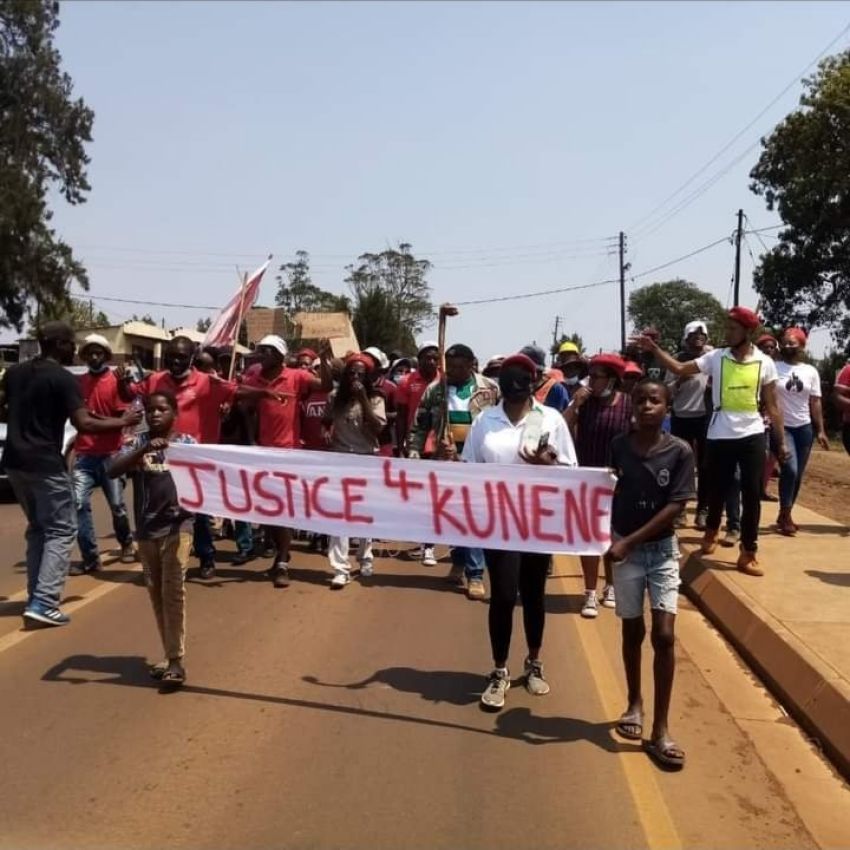
Pro-democracy protests are again escalating in the Kingdom of Eswatini (Swaziland), after activists were temporarily scared off the streets by the killing of dozens of activists and bystanders by the armed forces in June.
The police and army have again been called onto the streets. They have responded violently, using live ammunition to shoot at unarmed protesters, this time mainly primary, high school and college students and striking public transport workers.
Independent news reports and videos circulating on social media indicate that at least four people have been shot dead and more than 20 have been injured at the hands of the police this week. They include a high school student and a public transport worker.
The government has also made numerous threats, and shut down the internet and social media sites, in an attempt to quell the protests. Today (October 18) marks the sixth day of the protests that have effectively shut down the country’s major urban centres and blocked roads leading to the land-locked country’s borders.
Primary and high school students began protesting for education reforms and democracy several weeks ago. Protests intensified last week, with news reports indicating that least 100 schools had been closed by student protests and several had been damaged by fires lit by protesters.
The students are demanding that their exams be delayed and school fees refunded, due to school and university closures during the COVID-19 pandemic.
The students, along with striking public transport workers are also demanding the release from jail of pro-democracy Members of Parliament arrested in July on terrorism charges. They are also demanding charges be dropped against a third MP, Mduduzi Simelane, who is on the run.
Simelane is a popular gospel singer and evangelical pastor, and has been encouraging protesters (including the students) to continue taking to the streets, via social media.
Swazi students are required to pay significant fees for their education (approximately SZL5000 or A$500 a year to attend a poorly-resourced community or mission school). They are angry that they missed more than a year of education due to COVID-19 lockdowns, but the fees paid were not refunded. Student have not been given time to catch up in preparation for exams.
The government has refused to engage with the students’ demands. Instead, Prime Minister Cleopas Dlamini announced the indefinite closure of all schools on October 16.
Education Minister, Lady Howard Mabuza, issued threats that the government would not financially support protesting students who are eligible for government assistance (by definition these are all orphaned and vulnerable students). She also threatened that student protesters would not receive government university scholarships.
All three MPs were charged under the Suppression of Terrorism Act, after accepting petitions calling for democracy from their constituents in June. The two arrested were denied bail in several hearings in August and September. The Public Prosecutor added two counts of murder to their charge sheets on October 16, in connection with the murder of two men in the capital city in June. The details of the murder allegations have not been made public and it is not clear whether Simelane is also accused of murder.
Public transport workers are also calling for improved work conditions, an end to police corruption and improved roads. They accuse the police of demanding bribes for minor traffic offences, for example, stopping to collect passengers in non-designated areas. They are calling for an enquiry into corruption and have named officers who demand bribes from them. They are also demanding secure work contracts, a minimum wage of SZL4000 (A$367), overtime and pension fund contributions. The country has no legislated minimum wage.
The People’s United Democratic Front (PUDEMO), a political group with a socialist manifesto, has been active in organising these protests. In a country where the majority rely on buses and minibuses to move around, the strike has effectively shut down the country.
The striking workers are also picketing transport hubs and major roads, to ensure that scabs are not called in to run the transport system. They have called on businesses to close in solidarity and threatened to retaliate against those that refuse. Many small businesses appear to have heeded the call. However, major supermarkets have continued operating with police and army patrols provided by the government.
The Swazi government, headed by absolute Monarch King Mswati III, has responded violently. Armed police and soldiers roam the streets, and have been using live ammunition against protesters.
On the first day of the strike (October 13), a public transport worker in the rural area of Luyengo was shot dead by a police officer, reportedly while sitting under a tree with colleagues. Soldiers were filmed speeding into the Manzini public transport rank, raising their weapons and firing warning shots, while a group of protesting public transport workers stood in a group with their hands raised above their heads. Other citizen videos circulating on social media show the police shooting protesters with live ammunition at close range, and civilians assisting people with bullet wounds.
Police and soldiers have also been called into schools and colleges. Local media have reported that at least one high school student was shot by police with live ammunition, while trying to flee after police fired warning shots.
The international community is offering little support. Foreign embassies in Eswatini, including the United States and European Union, have been silent about the latest round of protests. The United Nations representative issued a cryptically-worded statement condemning violence in schools, however, it was not clear if it was condemning student protesters or the police who responded violently to them.
While the country’s future remains unclear, several things seem certain. The youth and many older people will no longer stand for the undemocratic political system. They are willing to risk their lives for political change. The situation will grow increasingly violent and more lives will be lost, unless the King relinquishes power and the international community support the calls for democracy.